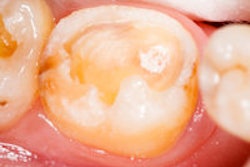A systematic review has shown that high-viscosity glass ionomers are not inferior to the current gold standard, according to the System Initiative from the University of the Witwatersrand in Johannesburg.
No clinical evidence suggests they are less suitable when placing restorations in posterior load-bearing teeth and when sealing pits and fissures to prevent the development of tooth caries, the initiative found.
To evaluate the current clinical evidence regarding the merits of glass ionomers as tooth restorations and sealants, the System Initiative of the Faculty of Health Sciences reviewed randomized controlled trials and longitudinal studies.
When all longitudinal studies published over the past 10 years involving high-viscosity glass-ionomer restorations were compared with those of amalgam restorations placed in posterior load-bearing teeth, amalgam generally performed better. However, no difference between high-viscosity glass ionomer and silver amalgam was found in all randomized controlled trials published during the same time period.
A similar systematic review of available literature also indicated a deficiency in clinical evidence to support the idea that resin-based fissure sealants protect better against tooth caries than glass ionomer-based sealants. A subsequent investigation to the original systematic review in 2008 was conducted in 2013 and established that its conclusion remains current.



















